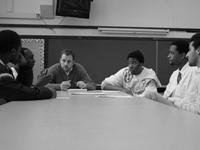In 1997, fewer than 10 percent of graduates from Manley Career Academy High School on Chicago’s west side went on to college.
Ted Christians leads a meeting.
In 2011, 65 percent of the graduating class was college-bound. What accounts for such a dramatic increase?
The answer is not what, but who: a group called “Umoja.”
Umoja, shorthand for the Umoja Student Development Corporation, is 27 adults who are invested in long-term, supportive relationships with students at Manley.
Since 1999, Ted Christians, a 1996 Calvin College alumnus, has been one of those adults; he is now Umoja’s executive director.
“For us, relationships open the door to helping young people see and believe in the best version of themselves,” Christians said.
“We ask, ‘Who are you meant to be? What do you have to offer the world?’ Then we say, ‘Let’s talk about what it takes to get you there.’”
Umoja walks with students along the road toward their dreams, offering academic skills workshops, job shadowing and internship opportunities, leadership and service training, scholarships and college visits.
Umoja is the Swahili word for “unity”; Umoja, the organization, puts all these components together in a unified approach.
Crucial to Umoja’s success has been its partnership with Manley High. Housed within the school itself, Umoja’s staff members develop programs in collaboration with teachers and administrators.
“They understand that we have to address our young people’s social [and] emotional needs,” says Christians. “If we don’t look at the whole person, it doesn’t matter what anyone teaches. It’s not going to take.”
Umoja now partners with nine other deeply challenged Chicago schools, bringing long-term, supportive relationships to over 8,000 students.
“The support doesn’t end when they walk across the high school stage,” Christians said.
Morgan Davis, a 2007 Calvin alumna, is Umoja’s alumni coordinator. She realizes that relationship-building often involves “intense conversations over long days in an emotionally charged environment.”
She spends her days calling, emailing, and meeting with graduates, whether they’re in college or on the job.
“We remind them that we can be a resource for them—whether linking them to a business professional or scholarship help—and that they can be self-sufficient persons,” she said.
About the Author
Chris Meehan is a freelance writer and commissioned pastor at Coit Community Church in Grand Rapids, Mich.









